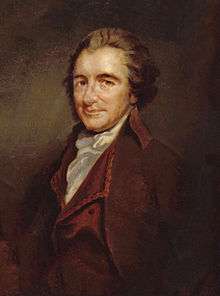Citizen's dividend

Citizen's dividend is a proposed policy based upon the principle that the natural world is the common property of all persons (see Georgism). It is proposed that all citizens receive regular payments (dividends) from revenue raised by leasing or taxing the monopoly of valuable land and other natural resources.
History
A concept akin to a citizen's dividend was known in Classical Athens. In 483 BC, a massive new seam of silver was found in the Athenian silver mines at Laurium.[1] The dispersal of this provoked great debate. The statesman Aristides proposed the profit from this should be distributed among the Athenian citizens.[2] However he was opposed by Themistocles, who proposed the money be spent building warships for the Athenian navy. In the end, Themistocles' policy was the one adopted.[2]
In the United Kingdom and United States, the idea can be traced back to Thomas Paine's essay, Agrarian Justice,[3] which is also considered one of the earliest proposals for a social security system. Thomas Paine summarized his view by stating that "Men did not make the earth. It is the value of the improvements only, and not the earth itself, that is individual property. Every proprietor owes to the community a ground rent for the land which he holds." Paine saw inheritance as being partly a common fund and wanted to supplement the citizen's dividend in a tax on inheritance transfers, but Georgist supporters now focus on natural resources.
Implementations and proposals
This concept is a form of basic income guarantee, where the citizen's dividend depends upon the value of natural resources or what could be titled as common goods like location values, seignorage, the electromagnetic spectrum, the industrial use of air (CO production), etc.[4]
The state of Alaska dispenses a form of citizen's dividend in its Permanent Fund dividend, which holds investments initially seeded by the state's revenue from mineral resources, particularly petroleum. In 2005, every eligible Alaskan resident (including children) received a check for $845.76. Over the 24-year history of the fund, it has paid out a total of $24,775.45 to every resident.[5] Alaska now has one of the lowest rates of inequality and relatively low levels of poverty compared to other US states.[6]
The concept is also promoted as a tool to reduce carbon emissions.[7] Peter Barnes created the concept of "Sky Trust" as an example of how this could be implemented. Barnes proposes setting up a public trust to manage the funds, separate from the private sector being taxed.[8] A calculation based on specific assets by Barnes estimates that American citizens could each get $5,000 per year by this model.[6] A Swiss campaign in 2013 advocated for a citizen’s income which could net each citizen an amount equivalent to $34,000 dollars.[6] A citizens dividend based on resources according to Thomas Pogge is due to every citizen because everyone owns an inalienable stake in all limited natural resources.[9] His theory goes along with Barnes with the exception of ownership, Pogge contends that the people own the resources.[4][10] The Progress Report says that the dividend should be valued by the free market.[11]
See also
- Asset-based egalitarianism (basic capital)
- Basic income
- Bleeding-heart libertarianism
- Demogrant
- Geolibertarianism
- Georgism
- Global resources dividend
- Land value tax
- Prosperity Bonus
- Social dividend
- Sovereign wealth fund
Notes
- ↑ Plutarch, Themistocles 4
- 1 2 Holland, pp. 219–222
- ↑ "Agrarian Justice," Thomas Paine
- 1 2 Makwana, Rajesh. "From Basic Income to Social Dividends: Sharing the Value of Common Resources". Medium. Retrieved 8 May 2015.
- ↑ "THE PERMANENT FUND DIVIDEND". Alaska Permanent Fund. Retrieved 12 December 2012.
- 1 2 3 Makwana, Rajesh. "From basic income to social dividends: sharing the value of common resources". Retrieved 15 April 2015.
- ↑ "Cap and Dividend". Institute for local self-reliance. Retrieved 11 Aug 2013.
- ↑ Barnes, Peter. With Liberty and Dividends for All (1 ed.). Berrett-Koehler. p. 128. ISBN 9781626562141.
- ↑ Pogge, Thomas (2001). "Eradicating Systemic Poverty: brief for a global resources dividend" (PDF). Journal of Human Development. 2 (1): 66. doi:10.1080/14649880120050246. Retrieved 15 April 2015.
- ↑ Pogge, Thomas (2002). World Poverty and Human Rights (1 ed.). Polity. p. 29. ISBN 9780745641430.
- ↑ "Citizens Dividend how big guaranteed income". The Progress Report. Retrieved 15 April 2015.
References
- Holland, Tom (2005). Persian Fire. Abacus. ISBN 978-0-349-11717-1.
- Clive Lord. A Citizens’ Income. John Carpenter, 2003. ISBN 1-897766-87-4.
- The Permanent Fund Dividend
External links
- Alaska Permanent Fund Dividend
- Progress.org: Citizen's Dividend
- Wealth and Want
- Citizen-ownership Democracy